DRINKING IN CHINA
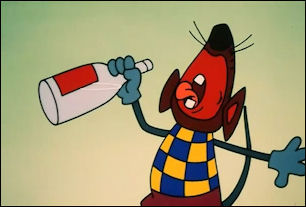
Drinking is often as much a kind of competition and a show of machismo as it is a means of enjoying oneself. As of it were sport, drinkers challenge one another to empty their glasses, which are immediately refilled with another shot. Failure to join in means loss of face.
Some Chinese turn bright red after only a few sips of alcohol. If they continue drinking they often vomit because their bodies reject the alcohol, a trait they share with many Japanese, Koreans and other Asians. About half of all Asians lack an active enzyme which breaks down acetaldehyde, a toxic chemical derived from ethanol found in most forms of alcohol. As a result when they drink they often get sick to their stomach, or at least turn red in the face. Most Westerners have this enzyme and can more easily break down acetaldehyde and consequently they need to drink much more alcohol to get drunk and don;t turn red in the face.
Public drunkenness is considered crass and uncouth. Women generally don't drink as much as men and those that do are often labeled as prostitutes. When women do drink they usually stick to beer. It is often unclear what the official drinking age is in China. Laws preventing the sale of tobacco products to minors were only put on the books in 2007 and even these laws failed to spell out punishments and how they would enforced. These days it is not considered outrageous for middle class Chinese to plop down a $150 for a bottle of scotch to serve to guests during holidays.
See Separate Articles: ALCOHOLIC DRINKS IN CHINA factsanddetails.com ; WINE IN CHINA factsanddetails.com ; DOMESTIC CHINESE WINES AND WINE-MAKING IN CHINA factsanddetails.com ; BEER IN CHINA factsanddetails.com ; BANQUETS, PARTYING AND DRINKING CUSTOMS IN CHINA factsanddetails.com ; FOOD, DRINKS AND CANNABIS IN ANCIENT CHINA factsanddetails.com
Websites and Sources: Alcohol Use in China oxfordjournals.org ; Warrior Tours warriortours.com ; Wikipedia article on Mao Tai Wikipedia ; Mao tai blog piece /endogenousretrovirus.blogspot.com ; Wikipedia article on Beer in China Wikipedia ; China Wine Info wines-info.com ;Gluckman on wine Gluckman.com ;
RECOMMENDED BOOKS: “Drunk in China: Baijiu and the World's Oldest Drinking Culture” by Derek Sandhaus Amazon.com; “Baijiu: The Essential Guide to Chinese Spirits” by Derek Sandhaus Amazon.com; “Science and Engineering of Chinese Liquor (Baijiu): Microbiology, Chemistry and Process Technology” by Yan Xu Amazon.com; “Baijiu by Definition: What Is Baijiu?” by Arlo Q Sterling Amazon.com; Chinese National Alcohols: Baijiu and Huangjiu by Baoguo Sun, Jihong Wu, et al. Amazon.com; Chinese Wine (Introductions to Chinese Culture) by Zhengping Li Amazon.com
Alcohol, Poets and Heroes in China
Alcohol has been both a source of inspiration and an object of veneration for Chinese poets. Many famous Chinese poets were notorious drinkers. One got drunk and drowned after he stepped off a boat and tried to walk on moonbeams.
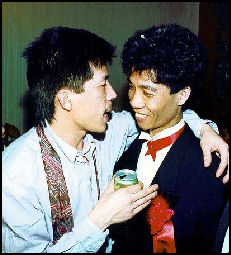 The famous Tang dynasty poet Li Bao (701-762) once referred to himself as the “god of imbibing.” It was said he was capable of “producing 100 poems after drinking a whole “dou” of wine.” A dou is equal to about 10 liters.. One of Li’s most famous poems, “Amidst Flowers with a Jug of Wine”, goes:
The famous Tang dynasty poet Li Bao (701-762) once referred to himself as the “god of imbibing.” It was said he was capable of “producing 100 poems after drinking a whole “dou” of wine.” A dou is equal to about 10 liters.. One of Li’s most famous poems, “Amidst Flowers with a Jug of Wine”, goes:
“Amidst flowers with a jug of wine
I pour alone lacking companionship
With a raised cup I invite the Moon
To toast my shadow, the three of us. “
Heros celebrated in legends and classical literature are often praised for their ability to consume large amounts of alcohol and drink any rival under the table. In “The Water Margin”, one of China’s four best-known classical novels, the hero, Wu Song, was warned not to drink too much before embarking on journey so he could be on guard for tiger attacks. Of course, not heeding the advise, he consuming so much alcohol he could barely walk he was attacked by a tiger but was able to fend off the animal with a stick and then kill it with his bare hands. The story, according to some, implies that alcohol gave him the courage to fight and if hadn’t been drunk he would have run away.
Drinking, Business and Banquets in China
Ritualized drinking is big part of conducting business and getting things accomplished in China. Banquets are a standard welcoming gesture and prerequisite to getting down to business. Restaurants often have special banquet rooms with private bathrooms and tables with place setting with three glasses: one of beer, one for wine and one for baijiu.
Hosts lose face if their guests are perceived as not having a good time and the key to making sure they do so is making sure they get enough to drink. An executive at a baijui maker told the New York Times, “It’s like a form of communication between people. It would be disrespectful to not drink with a guest.”
Tania Branigan wrote in The Guardian, “Alcohol certainly greases the wheels of business in the west, too, but people can usually stop after one or two glasses. In China, the opposite is often true: it is much easier to refuse an initial drink than to stop once you have started. Foreigners are not immune to the pressure — one friend recalls being poured half pints of baijiu by an overly hospitable local official, who paused briefly to vomit before topping up his glass again.”
Drinking to develop and cement relationships has a long history in China. "When one drinks with a friend, a thousand cups are not enough," runs one traditional saying. That does not mean bingeing has been the norm: in the 1980s, a study of Chinese classical poetry concluded that heavy drinking had been in and out of favour over the years. Experts have suggested that Chinese habits — consuming alcohol with food, playing drinking games and toasting in a highly ritualised fashion’served to regularise alcohol intake and limit drunkenness.
Officials drinking and feasting during lunchtime banquets is a big problem in China. Ordinary Chinese are outraged because cadres are often so drunk after lunch they can not do their jobs and the money to pay for the banquets often comes from public funds.
One taxi driver in Xinyang, a city of 7 million in Henan Province where the problem is said to be particularly bad, told the New York Times, ‘sometimes you’ll go to the civil affairs bureau after lunch and they are sleeping or playing cards. Sometimes you can’t even find anyone.” A Communist party chief, who is appalled by the custom, said, ‘service is not always a priority for government workers after a few hours of slugging down shots.”
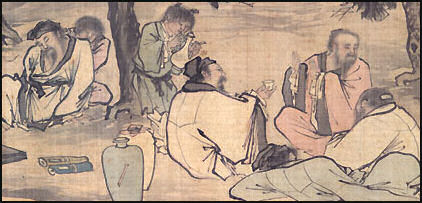
Drinking Culture in China
Tiffany May wrote in the New York Times:“Since the 1990s, alcohol consumption has increased by 70 percent in China, according to a study published in The Lancet in 2019. On average, Chinese residents drank seven liters of alcohol, the study found, while Americans drank 10 liters. But the study predicted that China’s per capita alcohol consumption would surpass American consumption by 2030. [Source: Tiffany May, New York Times, August 25, 2020] [Source: Tiffany May, New York Times, August 25, 2020]
“To clamp down on opulent banquets paid for with taxpayer money, China’s top leader, Xi Jinping, banned alcohol at military functions after he came to power in 2012. In 2013, he also introduced a national guideline prohibiting expensive liquors at events held by local governments and state enterprises.
“Though the bans resulted in a drop in liquor sales, some officials kept drinking together in secret. State news media reported that 20 officials were punished in Yunnan Province after binge-drinking at a government function in September 2017. A county official in Guangxi Province died of alcohol poisoning in April 2017 after celebrating his first day on the job with colleagues. Seven officials who had drunk with him were fired.
“Banquets can be an especially intimidating environment for young working women in China, who are often seated next to older executives and are expected to laugh at their jokes while being plied with alcohol, experts say. Some employees have dealt with the pressure to drink by resorting to discreet tricks, like pouring one’s drink on the floor. For better or worse, drunkenness is the aim of dinner banquets in China, the novelist Yan Ge wrote in a New York Times Op-Ed article in November. “When it goes wrong, it can be ugly: Fights can break out; women might be abused for sport, ” she wrote. “But when it goes right, mistakes are forgiven; the diners perspire, devour, quaff and sing together, and then, only then, will business be done.”
Chinese Man Slapped in the Face For Refusing a Drink With the Boss
Tiffany May wrote in the New York Times: “The new guy did not drink. During a company dinner in Beijing. his boss at Xiamen International Bank demanded that he order an alcoholic beverage. When he refused, he said, another executive slapped him. “It was the slap heard around the country, prompting broad reflection on a professional drinking culture in China that rewards excessive drinking and alienates those who do not imbibe. The employee recounted his experience on WeChat, a Chinese messaging app. But the episode really took off on social media when the bank apologized to the employee, whom it identified only by his last name, Yang. [Source: Tiffany May, New York Times, August 25, 2020]
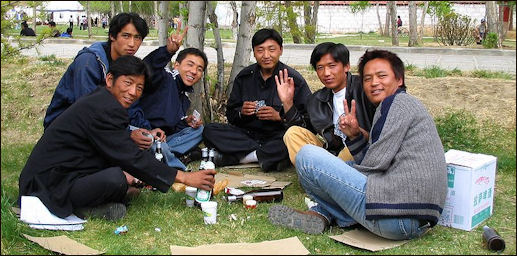
“Screenshots of Mr. Yang’s account, alongside the bank’s response, went viral, generating thousands of comments on Weibo, the Chinese microblogging platform. “If certain ‘cultures’ or ‘rituals’ come at the expense of health and mortality, can you still call it ‘culture?’” Xu Chao, a medical doctor based in Shandong Province, wrote in a widely shared blog post after the episode went public. In a statement that verified the broad strokes of Mr. Yang’s account, the bank said that two directors had engaged in verbal and physical acts of misconduct while intoxicated at a private dinner, causing disturbance and harm to Mr. Yang. The bank said it had deducted some of the pay of the two directors, from its Beijing branch, and had issued warnings to both for “drunken misconduct.” Mr. Yang’s boss, identified only by his surname, Dong, will not receive a performance-based bonus for six months, the bank added, and the branch manager will not receive a bonus for three months.
“Yang wrote that the dinner banquet, held at a luxury hotel in the capital, had destroyed his illusions about the finance industry. In the message he posted in a group chat, he said he had sensed that his abstinence would become an issue. He had alerted his boss before the banquet that he did not drink for personal reasons. But the boss still pressed him to swap his beverage for an alcoholic one. Mr. Yang wrote that he apologized, but did not give in. Then, he said, another director approached him with an expletive-laden rant for rejecting an offer of alcohol from a superior and smacked him on the cheek. As he left the banquet hall, he said, his new colleagues erupted in jeers.
“Some internet users in China praised his firm stance and warned against the risks of succumbing to pressure. But the pressure to drink, and the slap, sent him in search of answers. On the morning after the dinner, in a 114-person group chat for new hires, Mr. Yang asked recruiters whether alcohol was part of the job. “If I don’t drink alcohol, is that not in keeping with the company’s requirements?” he asked. “Does my experience exceed the pressure I should have borne professionally?”
“Yang Wenzhan, a lawyer in Beijing who is not related to the bank employee, wrote in a blog post on Monday: “If you say you don’t want to drink, that can provoke some people. But if you give in and say you’ll drink a little, then you’ve surrendered your line of defense. Afterward, when you say you’ve had enough, that will offend people.” But the lawyer, who is abstinent, said he had never been coerced into drinking against his will. Many social crowds are formed based on drinking habits, he noted, and dinner banquets can be divided into two tables: one for those who love to drink and another for those who do so moderately or not at all. “If you can drink and make professional connections, that will help, ” he wrote. “But if you don’t have this ability, you can still make a good lawyer.”
Binge Drinking Among Working Men in China
In the last few decades, consumption has soared, fuelled by increased personal freedoms and rising incomes. "Excessive drinking, frequent drinking [five to seven days a week] and binge drinking behaviour have reached epidemic proportions among current drinkers in China," warned a study published in the journal Addiction last month. The authors, led by Li Yichong of the National Centre for Chronic and Non-Communicable Disease Control, found that only 56 percent of men and 15 percent of women drink. But of those, 57 percent of men and 27 percent of women binge.
Tania Branigan wrote in The Guardian, “Bingeing and excessive drinking were most common in men aged between 35 and 44; and frequent drinking increased significantly with age, whereas in "Anglo" cultures alcohol consumption usually peaks in the late 20s or early 30s, the paper noted. The government has pledged to tackle driving under the influence — police caught half a million drunkards behind the wheel last year — but bingeing does not otherwise seem to lead to much anti-social behaviour in China. You won't see people urinating on the street, or the equivalent of beered-up rugby lads pulling down their trousers for the delectation of passing women.
So the main issue is the damage that drinkers are doing to themselves. China is still some way off the cirrhosis death rates seen in Britain or Japan, according to World Health Organisation figures. And in more cosmopolitan and educated circles, over-indulgence is often regarded as somewhat déclassé’suggesting that perhaps heavy drinking may fall out of fashion again. Anecdotally, friends suggest that people are increasingly willing to make excuses on health grounds or to surreptitiously dilute their baijiu with a mineral water bottle hidden under the table.
Binge Drinking and Getting Ahead in Life in China
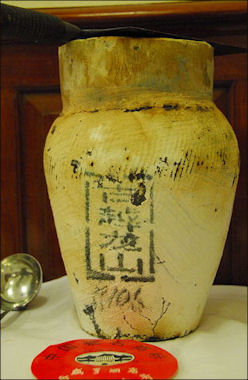
Shaoxing wine from Xian Binge drinking is becoming increasingly common among Chinese professionals — often it's even in the job description. Tania Branigan wrote in The Guardian, “Peter Chi knows he has to cut back on his drinking. It is not much fun at the best of times, and the worst have included hospitalisation — after drinking fake alcohol — and the numerous evenings where he has passed out at the table.” "No one likes binge drinking, but it's not under your control," he complains. "Of course I don't like it, but there's nothing I can do." [Source: Tania Branigan, The Guardian August 22, 2011]
Chi, from north-eastern Liaoning province, is not an alcoholic. Nor is he a party animal, despite his four-times-a-week binges. But as a respectable headteacher in his 40s, he feels he has little choice but to indulge — or risk harming his career. In the west, binge drinking is associated with young men and women spilling out of pubs and clubs in the early hours of the mornings. But in China drinkers are older and — in many cases — drinking not just for fun but for career reasons. "If I drink, it doesn't necessarily help me get promoted. But if I don't, it's less likely that I will be. So I must drink, even if it's not pleasant at all," Chi explains. "People want to show they are forthright and try to get along with others — It's very normal to get an order to drink from bosses."
In fact, some job adverts explicitly demand applicants who can hold their alcohol. "Candidates with good drinking capacity will be prioritised," says one for the Hunan Zhike Public Security Engineering Company, an alarms and surveillance technology firm that is seeking a business manager. "The job is to develop business through establishing closer connections with our clients. Drinking is a big part of the work," explains the recruiter, adding that the successful candidate will need to handle 250 to 500ml of baijiu at a time.
China's reluctant drinkers worry about what all the heavy drinking is doing to them. "Health is a big concern of mine. Even if things seem OK right now, there'll definitely be problems when I get to 30 or 40 if I keep drinking like this," says Bruce Wang, a young businessman whose work involves regular boozing sessions with clients. "I get drunk a lot It's impossible to feel good about it."
Heavy Drinking Cadres
The problem has gotten so out of hand in the city if Xinyang — where drunk cadres cost the city an estimated $2 million a month — that squads of booze police barge unannounced into offices and administer breathalyser tests to officials and police officers. Offenders are usually reprimanded or shamed with an account of their misdeed in a local newspaper.
More than 100 officials in Xinyang have been reprimanded for breaking the rules. The government said the campaign saved it 43 million yuan in first six month of 2007, enough to build at least 20 primary schools. The number of illnesses linked to excessive drinking fell by half.
Alcohol producers in Henan Province have challenged the ban on government officials drinking during lunch, arguing that drinking was a personal matter and government official should be allowed to drink during lunch as long as it does not affect their work. Baiju makers claim their sales have fallen by as much as a third since the ban was imposed.
Wang Tie, the initiator of the program, defends the ban, saying that officials can still enjoy a stiff drink after work. “This has won a warm welcome from the public, and we will firmly carry on with it.”
China’s Tradition of Drunk Officials
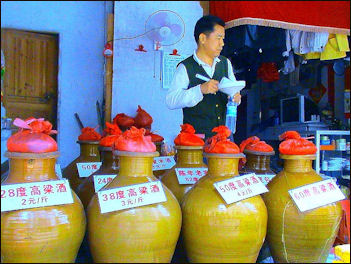
baiju
Austin Ramzy of the New York Times wrote: “China has a well-established tradition of boozy banquets to mark all manner of business, and local officials often find themselves called upon to drink several times a week. The results can be disastrous. In April 2014, a deputy township chief in Guangxi died of alcohol poisoning after drinking with his colleagues at a lunch banquet. Zhong Xiefei had been on his first day of his new job, the state news media reported. [Source: Austin Ramzy, Sinosphere blog, New York Times,, July 11, 2014 =/=]
“President Xi Jinping’s crackdown on corruption and extravagance has targeted officials’ culture of drinking. There are some signs that the prohibitions are cutting into alcohol consumption. Kweichow Moutai, one of China’s most famous brands of baijiu, a powerful spirit made from sorghum and other grains, said the crackdown on official indulgence had cut into its heady sales growth. Kweichow Moutai estimated that sales this year would increase only about 9 percent, the lowest rate in five years, the state-run China Daily newspaper reported in March. =/=
“Still, drunken officials remain a problem for the Communist Party. Wang Qikang, an executive with a state-owned tourism company, was fired and dismissed from the party after a cellphone video that showed him groping a woman on a Shanghai subway train circulated widely online. Mr. Wang said that he had been intoxicated when he repeatedly touched a 21-year-old passenger from Taiwan on the thigh, The Shanghai Daily reported =/=
Drunk Chinese Power Plant Boss 'Causes Blackout'
In November 2014, a drunk power station boss plunged a county into darkness after a barroom brawl in eastern China. According to the BBC: “Power was cut to thousands of homes and businesses for six hours in part of Henan province, after a group of power plant employees took issue with staff at a local karaoke joint, the South China Morning Post website reports. The group reportedly smashed up the bar after being refused a free round of drinks. During the melee, one of the officials threatened to "unleash the wrath of the electric tiger", as the state electricity system is known, by cutting the bar's power. They had already enjoyed crates of beer and "several bottles of expensive liquor" during their jaunt, the report says. [Source: BBC, November 11, 2014||||]
“Bar staff say they heard one of the men, who said he was the power plant's boss, on the phone asking for the plant to be shut down for repairs. A few minutes later, "half a county was plunged into darkness", the website says. State-owned Hebi City Electricity Supply Company has since apologised for the incident, saying it would learn "profound lessons". The plant's manager has been sacked and another member of staff suspended for two years, the company says, along with fines and warnings for the other brawlers. ||||
Chinese Cop Dies from Overdrinking and Ganbei Culture
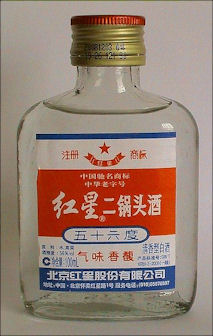
er guo tou In January 2009, 38-year-old policeman named Chendied after heavily drinking at a party. China Daily said police reported Chen died “while talking about work with the officials of Mabu village.” But an unnamed police source told the paper that one host after another had asked him to drink with them, urging him “ganbei” (“bottoms up”). The source said although the 38-year-old was known for his ability to hold his drink, he vomited and was left to rest on a nearby sofa. He was later taken to hospital, where doctors said he had choked to death. [Source: Tania Branigan, The Guardian, December, 15 2009]
Captain Xie Feiyong, who runs the local police division, said they designated Chen a martyr so that compensation for his family could be almost doubled to 650,000 yuan (£58,000). Xie said Chen had been a diligent and responsible policeman and that police need good connections with local officials, the Southern Metropolis Daily reported.
The case has highlighted a culture of obligatory drinking among local officials. Official dinners, particularly at lower levels, are notorious for repeated toasts that warm relations and can help to gain advantage in negotiations. Declining to drink with hosts is considered disrespectful. So serious has the problem become that some local leaders are said to hireassistants partly on the basis of their drinking ability, so they can share the burden.
In 2009, an unnamed official from Shandong complained to China Daily: “We would lose face if we could not get our guests drunk. Refusing to drink is considered disrespectful.”Neither my guests nor I want to get drunk but we have to play under the unspoken rule.”
There have been other official deaths this year through what is dubbed “ganbei culture”. Last year, a family planning official from Xinyang, in Hunan province, was posthumously given a merit award for dying with “honour” after he collapsed with a brain haemorrhage following an evening at a karaoke bar with fellow officials. A hospital report said binge drinking had contributed to his death.
Professor Li Chengyan, of the school of government at Peking University, said: “Drinking with official guests or other officials at alcohol-soaked events is considered part of the job. Officials are used to sealing deals and making decisions at dinner tables.” Li told China Daily it was wasting taxpayers' money as well as damaging officials' health. On average, officials spend about 500bn yuan a year in public funds on banquets, almost one-third of China's spending on dining out. But Li warned: “It will be extremely difficult to change the drinking culture among Chinese officials unless the government clearly legislates against such behavior.”
China Bans Alcohol in Military Banquets to Curb Graft
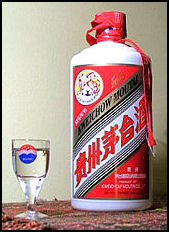
Mao tai
In December 2012, Reuters reported: “China has banned senior military officers from holding alcohol- fuelled banquets or from staying in luxury hotels when on work trips in the latest move by Communist Party chief Xi Jinping to fight corruption, state media reported. Receptions will also no longer feature welcome banners, red carpets, flowers, honor guards, performances or souvenirs, the powerful Central Military Commission, which Xi oversees, has decreed, major newspapers reported. [Source: Reuters, December 21, 2012 /=/]
“Officers will have to cut back on both the number and length of inspection tours, overseas visits, meetings and reports, according to the new rules. Speakers at meetings should avoid "empty talk", while the use of vehicles equipped with sirens will be "rigorously controlled during official visits in order to prevent public disturbances". "Additionally, commission officials are required to discipline their spouses, children and subordinates and make sure they do not take bribes." /=/
The rules echo similar demands made of party officials by Xi. The party, which has shown no sign of giving up its tight grip on power, has struggled to contain public anger at a seemingly endless stream of corruption scandals, particularly when officials are seen as abusing their posts to amass wealth.
China intensified a crackdown on rampant corruption in the military in the late 1990s, banning the People's Liberation Army from engaging in business. But it has crept back in recent years due to a lack of transparency, checks and balances and moral decay. A senior officer, Lieutenant General Gu Junshan, was sacked earlier this year in what Hong Kong media have said would be the biggest military corruption scandal since the Communists swept to power in 1949, though details have not been officially announced.
Guangxi Officials Told to Stay Sober
Austin Ramzy of the New York Times wrote: “The rules read like something imposed on a fraternity under double-secret probation. But as People’s Daily , the mouthpiece of China’s Communist Party, explained, they are meant for officials in the southern region of Guangxi. Officials there now face a list of restrictions on consuming alcohol that are meant to prevent them from reaching embarrassing and even dangerous levels of intoxication. [Source: Austin Ramzy, Sinosphere blog, New York Times,, July 11, 2014 =/=]
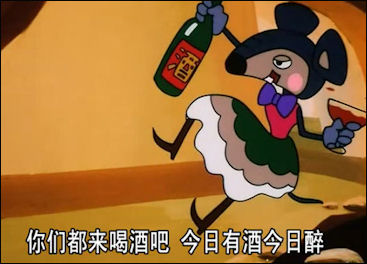
“According to the rules, Guangxi officials are barred from drinking on the job; playing drinking games or otherwise forcing people to drink in public places; being heavily drunk at any time; drinking in public while wearing an official uniform; drinking while carrying classified materials; and driving after drinking. =/=
In its report the People’s Daily quoted bits of a popular rhyme that says drinking “spoils the Communist Party spirit and ruins the stomach.” The full rhyme , not included in the report, tells the tale of a woman frustrated with her husband’s drinking. She visits various party and government organs for advice, including the Discipline Inspection Commission, which is charged with investigating corruption. The poem continues: The wife went to the Discipline Inspection Commission, At the door she met an old guard, The old guard said: Yesterday the bosses had a meeting, Seven committee members, four were drunk, the other three asleep in their hotel.”
Image Sources: 1) Beifan 2) Cgstock.com http://www.cgstock.com/china ; 3) and 4) University of Washington; Others Wiki commons, cartoons Asia Obscura
Text Sources: New York Times, Washington Post, Los Angeles Times, Times of London, National Geographic, The New Yorker, Time, Newsweek, Reuters, AP, Lonely Planet Guides, Compton’s Encyclopedia and various books and other publications.
Last updated October 2021
